
VOL. I NO. 13 DELHI, THURSDAY DECEMBER 10, 1942.
ARMADA OF JAP PLANES
There are only 15 shopping days until Christmas, chums, so don't forget that new sari for the little girl's shoulders! You guys with the head-hunters up in the Naga Hills can get along with some .30 caliber cartridge jackets for milady to waer in her ears and nose and, we suppose, they can have them "on the government" so to speak, but down here on "Per Diem Hill" it's saris or else and saris aren't G.I. We merely point this out to indicate that all is not beer and skittles in New Delhi. As you already know the House has passed the "Roundup Bill" exempting Christmas presents up to $50 from duty. The Senate is mulling around with one calling for $100 exemption. It will be passed in time for Christmas - 1943! However, you've undoubtedly done your Christmas shopping for the girls and others back home but how about the girls "and others" out here? Stores throughout India and China are naturally anxious for you to shop early, so they have cut prices to treble the value instead of 10-times. The "shopping early" business brings up the question of what to buy and for whom. We assume you want to be a "success," get a lot of promotions, leaves, furloughs and "deatched service" details in Kashmir. Ability and personality, naturally, are the only things that bring these gems to your collective diadem, but, anyway, here's what and for whom you should buy. For General Stilwell - a new campaign hat or at least a leather strap to replace the old shoestring he now uses to hold it on. For General Wheeler - a new chief of staff to replace the one he hasn't got any more. For General Bissell - a couple of new notebooks to replace those 25 he's already filled up with everything from plane losses to the price of petrified eggs in Manchuria. For General Ferris - two stars. For General Brady - a photographer who can stop trembling long enough to shoot a picture of him that is in focus. For General Chennault - a couple of World War I "Jennies" for his boys to fly. They don't need much else. For General Haynes - some vitamin pills for "the old broken-down transport pilot." For all colonels in the theater - a note of condolence and the remark that you know they should have been generals a long time ago. For all first sergeants - poison. 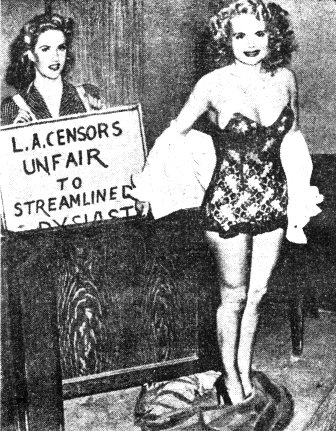 There's a big "conversation" struggle going on in Hollywood between the Police Commission and patriotic
actresses who want to "save" on clothes. Blonde Marie Wilson goes on strike against the commission's edict stating
that the wearing of fewer clothes is all part of the Hollywood war effort. We say "to hell with the Police Commission."
There's a big "conversation" struggle going on in Hollywood between the Police Commission and patriotic
actresses who want to "save" on clothes. Blonde Marie Wilson goes on strike against the commission's edict stating
that the wearing of fewer clothes is all part of the Hollywood war effort. We say "to hell with the Police Commission."
|
TWO AMERICAN SHIPS LOST AS
YANKS CONTINUE OFFENSIVE
Two American planes were lost over China last week as the CATF continued its all-out offensive against the Jap with six destructive raids against enemy shipping, troop concentrations and air installations, during which a flight of 20 interceptors was destroyed.
A flight of P-40's carried out a dual attack and reconnaissance mission in the Canton area during which a 6,000-ton freighter was probably sunk by dive-bombing planes but two American ships were shot down. One pilot is reported safe, however.
The official communiques follow:
1. On November 28 United States Army Air Force in China again attacked the Hongay-Campha port-Ha Tou area. B-25's escorted by P-40's bombed and strafed storage dumps, loaded freight trains, docks, shipping, warehouses, and many fires were started including one warehouse left burning fiercely. One ferry boat was sunk and direct hits were made on the power plant five miles east of Hongay. It is believed that this objective was completely demolished.
2. The United States Army in China continuing its recent air offensive in China, has successfully completed five more attacks against Japanese shipping, troop concentrations and air installations.
On November 25, in the Canton area, a flight of P-40's on a dual attack and reconnaissance mission dive bombed and probaly sunk a 6,000-ton freighter.
Two planes were lost; one pilot is reported safe and one missing in action.
The first night bombing mission by P-40's of the CATF was successfully completed at Hankow on November 25. Docks were bombed and strafed, and three searchlight batteries were destroyed and one gun-boat and one steamer damaged by precision strafing.
ALL SAFE
Two planes were damaged by heavy anti-aircraft fire. All pilots returned safely.
B-25's and P-40's, focusing their attack on enemy troop concentrations, struck Yocho and Sienning (south of Hankow) on November 26. Hits were scored on the waterfront at Hankow detonating large ammunition stores. Anti-aircraft batteries were silenced. Direct hits were made on a Japanese troop area, officer's quarters, and gas dumps. A direct hit was also believed to have been made on a railroad station.
In the Sienning area troop concentrations were bombed, factory buildings were destroyed and three hits were made on the adjacent railroad.
No enemy interception was attempted and anti-aircraft fire was inaffective. All planes returned safely.
SCOTT AND MORGAN
On November 27 at Canton and vicinity, the protective flights of P-40's, led by Col. Robert L. Scott, and the flight of B-25's led by Lt. Col. Herbert Morgan, successfully completed the most damaging fighter-bomber mission of the Air Force in China. Bombers sunk a 18,000-ton freighter midstream in the Wangpoa.
A 6,000-ton freighter was sunk under three direct hits and approximately 100 loaded lighters were either sunk or capsized. Protecting fighters, accepting heavy enemy odds confirmed a total of 20 enemy planes destroyed with six probables. Following the annihilation of the intercepting enemy force, our planes, in the face of heavy anti-aircraft fire, strafed and destroyed an unknown number of enemy aircraft of the fields of Tien Ho and White Cloud airdrome.
All pilots, crews and planes returned safely.
ORCHIDS, CHUMS!
The performance of our air force during the past two weeks has brought a literal flood of congratulatory radios from people in high estate.
Last week, the Roundup published General Stilwell's congratulations to the CATF and elsewhere in this issue appears Stilwell's felicitations to the India Air Task Force. Following are messages from General Bissell to an India fighter squadron for an unequaled maintenance record and a radio from Genera; "Hap" Arnold t the CATF.
Arnold radioed:
"The raids of November 25, 26 and 27 against troops, gun emplacements and shipping were ably planned and brilliantly executed and you have my heartiest congratulations and commendations. Extend my congratulations to your men. The effectiveness of our air arm against surface craft and the fact that we are superior to the enemy, even in our most remote combat zone has been emphasized to the American people by your remarkable succession of successful missions and impressiveness of the destruction against Jap shipping."
Bissell said to the fighter squadron (designation deleted):
"Because of the remarkable maintenance record established with tactical aircraft, the Commanding General of the Tenth Air Force desires to commend your personnel and that of the Air Service Command in the Assam area. Your December 5 status report that states you have 97½ percent of all assigned combat planes in commission has probably never been exceeded any place by Army air forces in a combat zone."
U.S. REPORTER VISITS
BENGAL CYCLONE SCENE
By SONIA TAMARA (New York Herald Tribune)
(This eyewitness account of conditions in Minapore illustrates vividly the reason the Roundup has asked you as American soldiers to contribute to Bengal relief. - Ed.)
Last week I visited the Midnapore district in the province of Bengal, where a cyclone accompanied by a tidal wave swept over hundreds of villages and towns. Six weeks have gone since the disaster, yet the situation of the people stricken by it has hardly improved and is still apalling. I shall never forget the plight I saw, the miserable, hungry, almost naked men, women and children, stunned by their misfortune, imploring for help.
The catastrophe is the worst of its kind in Bengal since 1864. It has come in wartime, when means of relief are crippled. Help is too slow and too scant. The misery will be great for a year to come, until the gathering of a new harvest. Many people have died in the storm and the flood. A great many more will die from exposure and starvation.
The hurricane came at 9 a.m. on October 16. The wind blew from the north until noon. The rain fell with such force that children exposed to it died on the spot. Trees were outrooted. Out of ten trees - big and strong ones - that I passed on the road, an average of seven lay on the ground. Mud huts - kacha houses as they call them - collapsed. The thatched roofs were carried off by the wind.
At noon the wind changed and began to blow from the West. A hug wave rose from the ocean and fell over the sand dam. It ran through open country washing everything in its way. 6,000 people were killed in the sub-division of Contai where I stayed a day. All the cattle along the shore died, all the houses came down, all the rice crop, ready to be gathered, was beaten down and impregnated with salt water.
That country is barren today. The people have nothing left, no clothes, no food, no homes. They need money to rebuild the huts, to dig new wells, to buy rice, to clothe themselves and their children. I saw women who have no clothes left to go out and draw their water or get a ration of rice. I saw a 13-year-old girl who survived the flood, alone out of her family, by tying herself by her hair and the cord of her plait to the trunk of a tree. She was found by her grandfather after 18 hours of torture.
The Government and private organizations are helping but it is not enough. Any rupee will be welcome. With the twenty rupees Walter Briggs of the United Press and myself left, two villages were going to eat for several days.
RELIEF TOTAL NOW RS. 2,106
The following contributions have been received to-date: | ||||||||||||||||||||||||||||||||||||||
| Rs. | A.
| C.B.I. Roundup | 100 | 0
| Rear Echelon, CBI | 326 | 0
| Miss Nickerson, Red Cross | 20 | 0
| War Correspondents | 230 | 0
| Officers, 10th AF | 738 | 0
| Enlisted Men, 10th AF | 205 | 0
| AG Pers. & Misc. Section SOS | 70 | 0
| Officers, SOS | 170 | 0
| Enlisted Men, SOS | 32 | 0
| Air Depot Gp & attached units | 211 | 7
| Miscellaneous | 4 | 0
| Total collections to date | 2,106 | 7
| |
Sonia Tamara, CBI's favorite and only gal war correspondent, is back from sojourns along the front, which included a visit to the devastated cyclone-stricken belt. So touching was her story of what she heard and saw there that two hard-hearted male correspondents, who had previously passed up the C.B.I. Roundup Relief Fund, at once snapped the safety-pins on their money pockets and kicked in with 70 chips. We pledged we would print no-mommy-no-poppy appeals in connection with this solicitation. Miss Tamara's story appearing elsewhere gives only sketchy facts in the tragedy.
The Roundup has set December 15th as the dead-line for Army collections. After that date send funds to the Indian Red Cross in New Delhi direct.
The score this week totals Rs.2,106-7.
Exdept for the collection sent in from an outside air depot and small contributions mailed directly to the Roundup, all of this sum has been raised among personnel stationed in New Delhi. We imagine collections from other stations are en route to the fund custodian via the leisurely Indian mails.
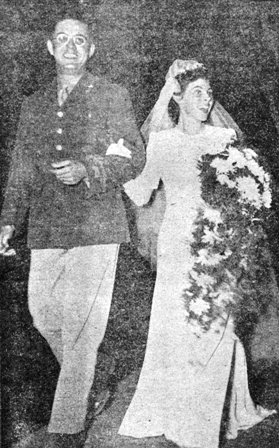 First member of this Theater to be married here is Lieut. Frederick H. Levenhagen, who comes down the aisle
with pretty Sheila Lucille Casey, of Kilnarney, County Kerry, Ireland, following their nuptial cermony at an
air depot in India. The romance budded in Calcutta more than two years ago where the groom was working for an
American firm before he was commissioned.
First member of this Theater to be married here is Lieut. Frederick H. Levenhagen, who comes down the aisle
with pretty Sheila Lucille Casey, of Kilnarney, County Kerry, Ireland, following their nuptial cermony at an
air depot in India. The romance budded in Calcutta more than two years ago where the groom was working for an
American firm before he was commissioned.
|
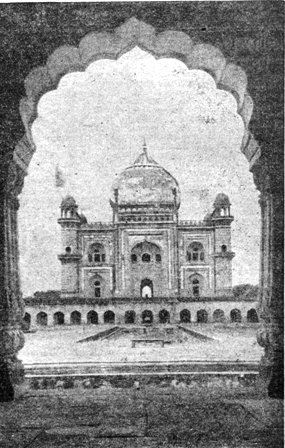 First winning photo in the Roundup's weekly amateur photo contest is this picture of a mosque in Central
India. Warrant Officer John H. Murphy shot it with a single shutter speed camera fitted with a K2 filter.
First winning photo in the Roundup's weekly amateur photo contest is this picture of a mosque in Central
India. Warrant Officer John H. Murphy shot it with a single shutter speed camera fitted with a K2 filter.
|
IATF AGAIN
RAIDS BURMA
Nearly 100 bombs were dropped with telling effect on a concentration of Japanese transport, estimated to contain 300 trucks, when heavy bombers of the India Air Task Force raided Pyawbwe, 75 miles south of Mandalay, December 4.
The communique also added that all aircraft and crews returned safely.
DON'T BE
SUCH CHUMPS
Word has just come in that some of our boys made collective chumps out of themselves by arguing about removing their shoes in a mosque.
Specifically the action occured in the Jam Masjid and the men, possibly due to misunderstanding, are reported to have removed their shoes only after considerable argument with the Muslims present.
All Indians are deeply religious and sentimental people and little acts of carelessness like the above do more to injure our relations with them than anything else.
JUST BEFORE OUR BOYS RANG THE JAP GONG AT HONG KONG
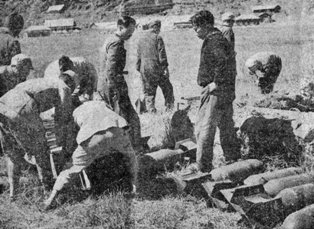 Here are a few of the eggs our boys dropped on a strategic Jap-held port. These young Chinese have become
expert bomb loaders because they've had plenty of practice in helping to pour it on the Jap.
Here are a few of the eggs our boys dropped on a strategic Jap-held port. These young Chinese have become
expert bomb loaders because they've had plenty of practice in helping to pour it on the Jap.
|
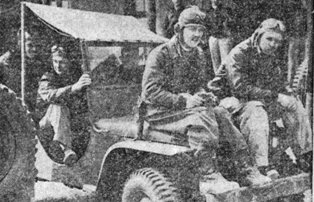 The fellows who were at the controls of some of the planes that raided Hong Kong several weeks ago board a
jeep at their quarters, en route to the air field.
The fellows who were at the controls of some of the planes that raided Hong Kong several weeks ago board a
jeep at their quarters, en route to the air field.
|
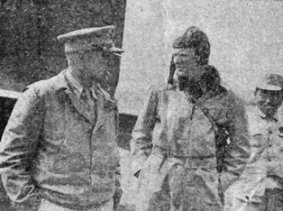 Two veterans in the business of knocking the Nip out of the sky are Brig. Gen. Caleb V. Haynes and Maj. Tex Hill.
They are seen talking it over just before take-off. Tex took off to lead his squadron in to action.
Two veterans in the business of knocking the Nip out of the sky are Brig. Gen. Caleb V. Haynes and Maj. Tex Hill.
They are seen talking it over just before take-off. Tex took off to lead his squadron in to action.
|
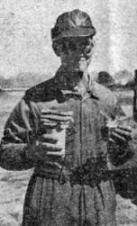 A member of one of the raiding crews tears into a few sandwiches before going about his chores. He's also developed
a healthy appeitite for Japanese.
A member of one of the raiding crews tears into a few sandwiches before going about his chores. He's also developed
a healthy appeitite for Japanese.
|
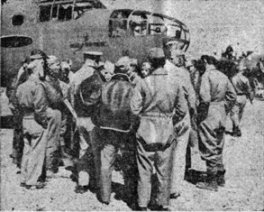 Pilots, crew members and correspondents surround General Haynes to listen to last-minute instruction just before
take-off. Results of the raid showed that the boys missed none of their signals.
Pilots, crew members and correspondents surround General Haynes to listen to last-minute instruction just before
take-off. Results of the raid showed that the boys missed none of their signals.
|
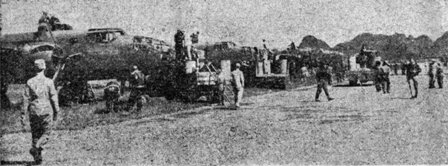 Gas goes in as our damage-dealing bombers are readied for action. Chinese aid our ground crews whose enthusiasm
and hard work have played a heavy role in the many successes.
Gas goes in as our damage-dealing bombers are readied for action. Chinese aid our ground crews whose enthusiasm
and hard work have played a heavy role in the many successes.
|
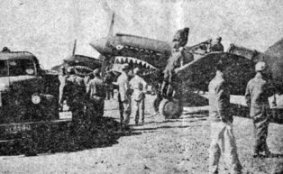 Shark-toothed fighter planes, an old nemisis of Jap airmen in this part of the world, get gas and final check
over from ground crews prior to their escorting assignment. These planes further annoy the Japs with their murderous
strafing.
Shark-toothed fighter planes, an old nemisis of Jap airmen in this part of the world, get gas and final check
over from ground crews prior to their escorting assignment. These planes further annoy the Japs with their murderous
strafing.
|
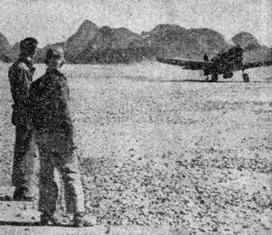 A fighter plane returns to the base after rightly but not politely completing its duties. The spectators are
ground crewmen who keep 'em flying.
A fighter plane returns to the base after rightly but not politely completing its duties. The spectators are
ground crewmen who keep 'em flying.
|
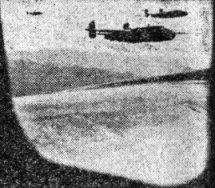 Through the window of an accompanying plane, H.S. "Newsreel" Wong, famed cameraman who took all the pictures
on this page, catches these bombers in formation on their way to the target.
Through the window of an accompanying plane, H.S. "Newsreel" Wong, famed cameraman who took all the pictures
on this page, catches these bombers in formation on their way to the target.
|
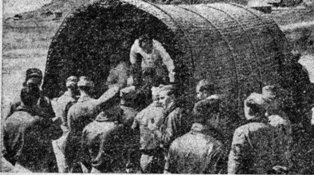 The chow wagon is on the field to quell the hunger of the returning airmen as they compare notes on Nips.
The chow wagon is on the field to quell the hunger of the returning airmen as they compare notes on Nips.
|
U.S. PILOTS DOWN 28 JAP PLANES OVER CANTON
With the American Air Forces in China - American fliers, in their most successful operation of the war, shot down 23 and possibly 28 Japanese planes over Canton recently and spread devastation on shipping and harbor facilities at the great Pearl River base, the American United Press reported.
Fighter planes of the 23rd U.S. Pursuit Group cleared the skies of enemy interceptors and bombers and dropped six tons of bombs on the Pearl River estuary, sinking two freighters and about 100 barges. Huge fires
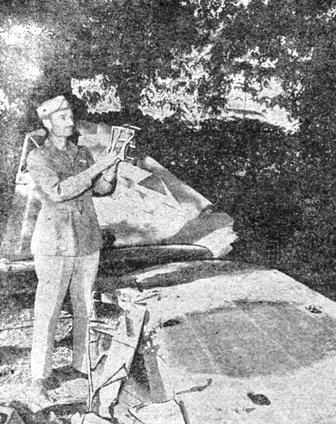 Col. Homer L. Sanders, acting executive officer of the IATF, studies the remains of three Jap planes shot down
over Assam.
Col. Homer L. Sanders, acting executive officer of the IATF, studies the remains of three Jap planes shot down
over Assam.
|
The girst wave of bombers, under the command of Lt. Col. Herbert Morgan of Freedom, Pennsylvania, scored three hits on the deck of an 8,000-ton freighter and destroyed about 50 barges nearby. Col. Morgan declared: "We consider that the freighter was definitely sunk. Fighter pilots reported ten minutes later that the entire ship was ablaze and sinking fast."
The second flight of bombers, led by Major William Baste of Independence, Missouri, destroyed a 6,000 to 8,000 ton freighter and also about 50 barges.
The third flight, commanded by Capt. Everett Holston of Tacoma, Washington, bombed large storage areas on the north bank of the river and started at least six large fires.
The bombers met a terrific anti-aircraft barrage, but there was not an American casualty.
Within two minutes of the arrival of the first wave, Japanese fighter planes rose to attack. Four Zeros pounced on nine bombers but were caught in a volley from diving American P-40s.
Lt. William Druwing of Boston scored the first victory, when he riddles and set afire a Zero. He then dived on another Zero, sending it to the ground. Sergeant Adam Williams of Morgantown, North Carolina, shot down one I-97 while each of two bomber gunners scored a probable victory.
Col. Robert L. Scott of Macon, Georgia, commander of the 23rd Group, got his tenth confirmed victory by shooting down two Zeros. Col. Scott, braving strong anti-aircraft fire, strafed a Japanese airfield and barracks and riddles a three-engined transport.
Major Bruce Holloway of Knoxville got a Zero at the first burst, probably another, and destroyed a two-engined Japanese I-45. Capt. J. N. Hamshire of Grant's pass, Oregon, bagged three Zeros. Other American pilots got one enemy plane each.
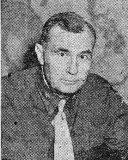
Chief of Staff |
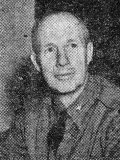
Deputy Chief of Staff |
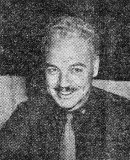
G-1 |
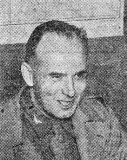
G-2 |
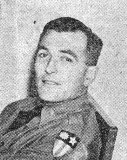
G-3 |
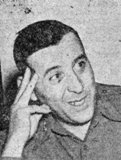
Adjutant General |
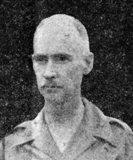
Surgeon |
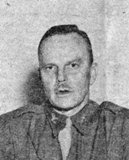
Inspector General |
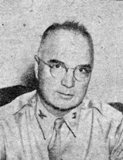
Finance Officer |
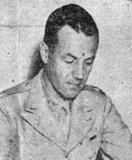
Signal Officer |
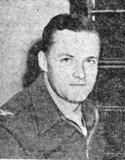
Artllery Officer |
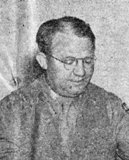
Ordnance Officer |
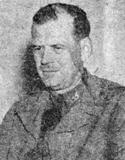
Judge Advocate |
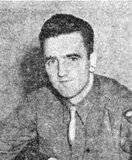
Public Services Officer |
|
THE USE OF AIR POWER IN ASIA
By Barnet Nover (This is reprinted from the Washington Post)
At a time when the news from the Solomons is distinctly gloomy, we can take some measure of comfort, at least, in the exploits of the United States Army Air Force in China. For it is there, on the mainland of Asia, rather than on the island battlefields of the Southwest Pacific, that the ultimate pattern of victory against Japan is most clearly discernable.
That victory, Ambassador Grew has done well to warn us, is still a long way off and will not be easy of achievement. It will recide still further into the distance if we lose the air base which we acquired at such great cost on Guadalcanal Island last August and which we have managed to retain up to now, again at a considerable cost.
But, as President Roosevelt indicated to his pree conference the other day, the struggle in the Solomons while fierce and bloody and important is not decisive. Whatever happens there will constitute only one, theough an important, episode in a long and bloody campaign.
U.S. FOOTHOLD
If we retain our foothold on Guadalcanal and at Tulagi we shall have won a great defensive victory and may be able, in due course, to continue the process of rolling up the map of Japan's conquests.
If we lose the Solomons, Japan will be in a position to threaten our supply line to Australia. But in view of her heavy losses in the battle for Guadalcanal, she may, even if victorious, need time to recuperate before undertaking a new offensive south and east of the Solomons.
In that case we would be given time to build up our defensive strength in the Southwest Pacific to the point where the enemy can effectively be held at bay. In any evet, a Japanese victory in the Solomons would not constitute a direct threat to any of the major United Nations' bastions in the Pacific - Australia, New Zealand, Pearl Harbor, Midway, Alaska, China.
The raids which our air force in China has been carrying out against such widely separated points as the Kailan coal mines, near Tientsin, the power plant at Hong Kong and the air field at Canton belong, qualitatively, in a different category.
It would be folly, of course, to exaggerate the immediate importance of those raids. They have their distinct usefulness as factors in the war of attrition against Japan. But in terms of actual damage done to enemy holdings these raids were merely pin-pricks.
The plain and unpleasant fact is, as Wendell Willkie indicated in his radio address the other night, that from a quantatative viewpoint the air force we have thus far sent into China is pitifully small.
SIGNIFICANCE
The significance of these raids by our Army Air Force in China lies in the fact that they demonstrate what can be done of there is the material with which to do it.
Hong Kong and the Kailan mines - points 1,300 miles removed from each other - can be bombed the presumption must be either that we are in a position to operate from a great many widely scattered air fields in China or that the range of our bomber is great or both. It means, further, that there is hardly a point held by the Japanese in China which is safe from Allied aerial attack.
Given any measurable increase in the size of our air force in China and Japan would soon be facing the same dilemma with which their Nazi allies have been confronted all this year. They would have to decide whether to employ their not unlimited air power largely or exclusively for offensive action - and thus leave themselves open to Allied air attacks over large stretches of their holdings - or else spread their air power thin.
Germany chose the former course. The Luftwaffe, Field Marshal Goering himself has admitted, has not been big enough to enable the Reich to carry out offensive operations in the Caucasus and along the Volga while, at the same time, providing the exposed German cities of the Ruhr and Rhineland with adequate defensive air power. Germany chose to concentrate on the Eastern Front and depend largely on anti-aircraft to beat off Allied bombing raids.
COST TO GERMANY
The cost to Germany resulting in this decision has been great. Many great German industrial centers have been devastated.
In this particular Japan is both more and less vulnerable. The time is yet distant when large-scale and continuous air attacks on Japanese cities - in contrast to Japanese-held places - can be launched. On the other hand, japan, unlike Germany, does have to reckon with a large army which is already in existence along her flank. For Japan to leave herself exposed in China to Allied air power may mean giving the Chinese armies a chance to counter-attack and drive them out of one point after another.
The Chinese armies lack equipment and are in no position to manufacture it. It must be brought in from the outside - from the United States and Great Britain in particular - just as all the bombers, fighters, crew and gasoline needed by the USAAF to do a real offensive job must be brought in.
That is why an ultimate Allied attempt to retake Burma is essential. If Burma is recaptured the Burma Road can be reopened and a very much greater flow of war goods into China would be possible than is possible now. Furthermore, if Burma were retaken the large reserves of land and air power now being husbanded for the defense of India could be employed for an offensive against Japan from Chinese bases.
The attack on Hong Kong and kailan by General Chennault's intrepid fliers is a straw blowing in the wind of the future. It may become a hurricane capable of sweeping the Japanese out of the Asian mainland and ultimately destroying them in their home islands. It will remain only a zephyr so long as our air force in China is not greatly expanded and the Burma supply route to China is not reopened.
|
Don't mention where you'll be Your careless word If overheard May aid the enemy." These orders from Headquarters Have got me in a spin Nobody tells me anything - Except we're going to win. I'm not the Mata Hari type. I'm strictly A.N.C. I don't talk much Of war and such My favorite subject's - ME Now ever since that warning I've reached an all time low A nod, a smile, a subtle glance - But mostly just plain - NO! - Lt. Elizabeth Shaunty |
|
Well, we are that - and still more We're like a family it would seem With but one thought - to even the score. We work together; we play together; We share happiness, joy and sorrow. It seems it makes no difference whether The sun even rises on the morrow Epicureans are we, inhaling loads of sherry It's never mentioned for all know why To-day we eat, drink and make merry -To-morrow we may die. Amazing it is to note the unity Achieved by facing hardship and danger Eluding ack-ack, fighting Zeros with impunity. Each time, however, you're still a stranger We don't look at war as having fun We get so scared our teeth grate Tho we enjoy a crack at the Jap or Hun. It's for the return trip that we await. - Lt. Hubert U. Simmons |

THE CALL OF INDIA And the call of the canyon a million more. The call of the sea takes men away, To roam the world for many a day. The call to arms takes men from home and toil, To fight and die on foreign soil. But for calls of this and calls for that. This new call beats them in nothing flat; I hope and pray it soon will cease - The call of India - Sahib, Baksheesh. - Sent in by Sgt. John T. Dunn |
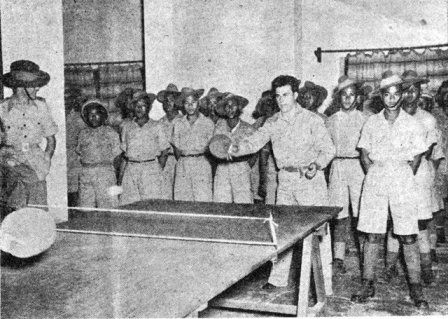 GURKHA PARATROOPS - Judging by the expressions on their faces these Gurkha paratroops were not particularly
impressed with Corp. Laurence M. Umholtz's ping-pong game when they visited the 10th Air Force barracks a while back.
GURKHA PARATROOPS - Judging by the expressions on their faces these Gurkha paratroops were not particularly
impressed with Corp. Laurence M. Umholtz's ping-pong game when they visited the 10th Air Force barracks a while back.
|
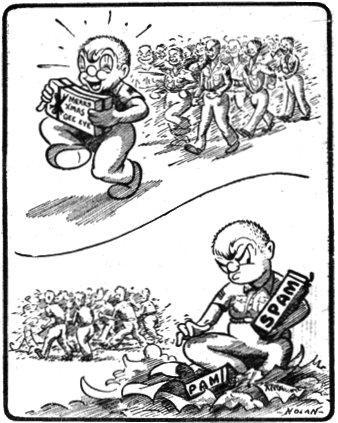
|
THANKSGIVING DINNER CAUGHT THE HARD WAY
By CORP. KARL PETERSON
Back where 1st Sgt. Romaine Christie comes from, Thanksgiving means poultry on the table, so when the local beanshooters made with the canned stew on the day of feasting, he and S/Sgt. Shelby (Where's My Transfusion) Scott, disappeared quietly into the brush, to return later with sundry startled-looking chickens and no questions asked. Followed blood, feathers, hot water, stoking of fires behind the bamboo basha, and at last chicken roasting on sharp sticks over a crackling blaze.
The first sample of "living off the land" so pleased the boys that next afternoon found them stalking a small white goat for fricasseeing purposes. The hunt broke up when the kid made a dash for it, the ensuing clamor aroused the local Indians to register an emphatic "Nai, sahib," and Corp. Al Sorrentino sorrowfully laid down his ax, lamenting "And I was gonna plant it right between his horns."
T/Sgt. French O. Cox, Heaven's gift to ruined radio sets, was gone last week and in his place was Warrant Officer (Junior grade) Cox, as uncomfortable a looking gent as ever sat self-consciously for the first time at the officers' mess table. His old buddies, who don't see but one Warrant Officer per coon's age, were undecided whether he should be properly addressed as "sir," "Mr. Cox," "Good old Coxie," or "Junior," but there was no doubt about the congratulations extended by all.
|
The most stripe-happy set of characters in all India today are the cooks, bearers, sweepers et al, employed at a bungalow in the vicinity. The officers resident therein outfitted their crew with G.I. flight caps and khaki blouses carrying an assortment of bright chevrons. Suma, graying veteran of the domestic staff, is now a First Sergeant with seven "hitches" to his credit, the head cook made Tech, and so on down to the junior boot polisher, aged fourteen, who nailed a Pfc.
Heard along the daily grind: Sgt. Bernie Henderson, staggering, empty-pocketed from a rugged poker game in "Shebangi No. 1." "Call me Christian, they just made a believer out of me."
Corp. "Jeeter" Revelle: "They ought to turn Jap prisoners over to those Army dentists; when those men finish with 'em - what they ain't told, they don't know."
ORCHIDS TO T/SGT. WHITE
Congrats to T/Sgt. John M. White on the fine job he is doing as the "Big Noise" of the QM Office at a certain Indian Air Base.
It seems that an unexpected order took the Quartermaster (Captain Charles T. Boyd, Jr.), and the majority of the QM personnel to distant parts at double time leaving "Chalky" White with but three experienced men to perform complete base Quartermaster functions.
Sgt. Vincent "Baby Sandy" Sands, Corp. William "McGee" Herring and Pfc. Edward "Betelnut" Kroll (three tried and proven QM boys) not only must do the work of two men each, but at the same time train new men to do their respective jobs efficiently.
It's a mighty big job and one that is seldom fully appreciated by the other services. "Thumbs Up" to White and his men.
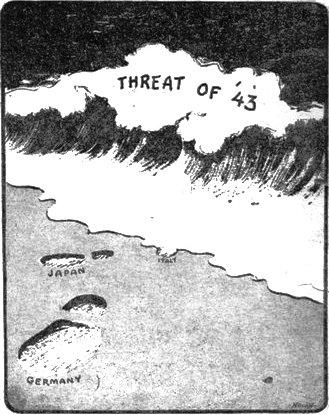
|
A YEAR AND THREE DAYS!
Just a year and three days ago we went to war!
We got caught with our pants down so far that when we tried to run after the guy who hit us, all we did was to trip up and fall down for quite a while.
We must have been a rather sad sight for a while as we staggered gradually upright from the crushing blows at Pearl Harbor, the Philippines and went through the inevitable confusion attendant to the transfer of our industry from a "business as usual" basis to all out war production.
There are still rumblings that all is not running with Henry Ford-efficiency at home, but there have been a few things to be proud of during the past year and three days.
At the top, naturally, was the smooth handling of the invasion of West Africa. General Eisenhower's men, green as modern soldiers go, walked in against strong opposition in spots and cleaned up the job with dispatch. The operation has put Hitler on the strategic defensive for the first time in this war.
A great deal of the credit for this maneuver goes to our much-maligned State Department who, though riduculed as a house full of appeasers, went its own quiet way laying the diplomatic ground work for the action to follow.
Second spot should go to the Marines, the Army and Navy in the Solomons. It hasn't been a large engagement like the Russian campaign where numbers are reckoned in the hundreds of thousands. Rather it has been one of those small, bitter, back-room brawls where the guy with the most guts walks out. Each day's paper bears new testimony on how our lads are making the Japs eat crow at their own specialty - jungle warfare - on one of the most impenetrable jungles of the world.
Third position in this handicap should probably go to the Navy for its brilliant work in the Midway and Coral Sea engagements as well as the most recent naval battles about the Solomons.
The drastic Jap losses in ships and men in these battles has been of tremendous value to this theater. Were it not that the Midway and Coral Sea engagements were of a defensive nature they might rate the top spot in this dissertation.
Our own theater hasn'tbeen up at the top, but through no fault of ours. You don't win campaigns without ground troops and our Doughboys strength has always been somewhat under 100,000 - including bearers.
We can spit in anybody's eye out here, however, when we talk about our air force.
Starting from scratch with planes some of which were already worn out and in pitiful strength we held our own for weeks while outnumbered in ratios exceeding 10-1. Then we got more planes - some that actually had a few hours left in them before motor changes were in order. You all know what happened then.
Our boys ranged from Rangoon to the Linsi mines dealing death and destruction that made Jap raids seem as cold as a mother-in-law's kiss. General Chennault took over a bunch of green Army fliers and, after a moderate start, carried on the glorious tradition he built as CO of the AVG.
They got General Haynes to handle the India Air Task Force after a tour under Chennault and he started dropping bombs like wedding rice all over Burma occasionally accompanied by leaflets stating "with compliments of the old, broken-down transport pilot."
Our pursuit pilots have licked the Jap at a ratio of better than 10-to-one. They've said to Hirohito, in effect, "take off your glasses, you little squirt, and we'll kick your teeth down your throat."
On other fronts, we've been helpful and possibly sensational. Although manning a small percentage of the air over the Middle East we have scored a disproportionate amount of damage. Our tanks had something to do with the Eighth Army victory. Our equipment and supplies to Russia have undoubtedly helped them maintain the most gallant stand of this or probably any other war and are helping their current offensive. Our aircraft are now ranging out over dominated Europe from Britain.
Our submarines are sinking Jap shipping from hell to breakfast and don't forget that a certain general in this theater (initials J.W.S.) did as much as any single American in establishing the fundamental honesty of an American Army officer when he refusxed to alibi his part of the Burma campaign and said:
"We got the hell licked out of us. It was humiliating as hell."
Maybe we haven't set the world on fire yet, but we've started a little blaze!
The C.B.I. Roundup is a weekly newspaper published by and for the men of the United States Army Forces in China, Burma, and India, from news and pictures supplied by staff members, soldier correspondents, Office of War Information and other sources. The Roundup is published Thursday of each week and is printed by The Statesman in New Delhi, India. Editorial matter should be sent directly to Major Fred Eldridge, Rear Echelon Hq., U.S.A.F. C.B.I., New Delhi, and should arrive not later than Monday in order to make that week's issue. Pictures must arrive by Sunday and must be negatives or enlargements. Stories should contain full name and organization of sender.

DECEMBER 10, 1942
Adapted from the original issue of CBI Roundup
Copyright © 2009 Carl Warren Weidenburner
TOP OF PAGE PRINT THIS PAGE ABOUT THIS PAGE SEND COMMENTS
PREVIOUS ISSUE CLOSE THIS WINDOW NEXT ISSUE
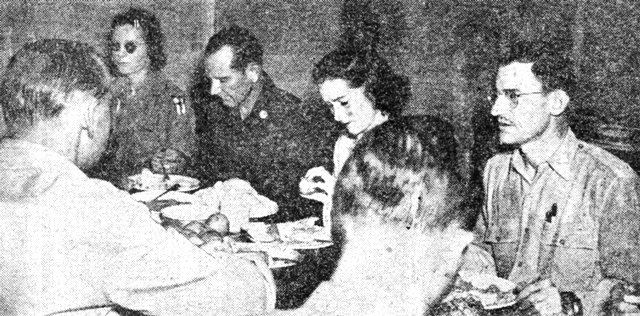 Reports are still coming in about the fine Thanksgiving food that was served up throughout the Theater.
Here is photographic evidence of such at an Air Depot in India. The diners facing the camera are
Lieut. Smith, Sgt. E. W. Rayborn, who is responsible for the good food, Lieut. Winn, and Captain Raymond.
Reports are still coming in about the fine Thanksgiving food that was served up throughout the Theater.
Here is photographic evidence of such at an Air Depot in India. The diners facing the camera are
Lieut. Smith, Sgt. E. W. Rayborn, who is responsible for the good food, Lieut. Winn, and Captain Raymond.